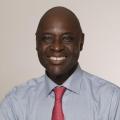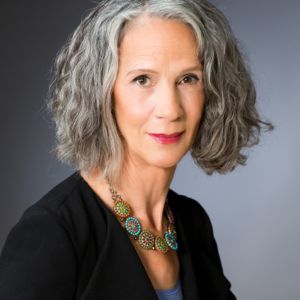In this episode of Lessons from Leaders, Lynne Gilliland sits down with Pape Gaye, President Emeritus at IntraHealth. Pape shares his origin story, remembering his first introductions to the Peace Corps as a teen in Senegal, and challenges our traditional ideas of what leadership looks like. Pape advocates for boundless joy and curiosity in adaptable leadership, bridging gaps between communities to find fresh perspective and approach.
Below is an abridged excerpt from the episode—watch the full video to hear the entire interview!
Lynne Gilliland:
Just to start with, how about a little catch-up about how you got here, your story about how you actually ended up being at InterHealth—which is quite an interesting trajectory as a young man—and ending up in the U.S.?
Pape Gaye:
I had an opportunity to learn a little bit more about what the Peace Corps was, and this gentleman, his name was Gary Anglebook, created an opportunity for me and a few friends to spend time with volunteers in their villages. It was very revealing because even though I’m African, I’m Senegalese, I was a ‘city boy’—I grew up in Dakar, I had not until then an opportunity to spend a lot of time in the village. So I got to learn about the life of the Peace Corps volunteer, and I must say I was greatly inspired. I think that’s really what put me in the trajectory that I then took.
When we returned to the U.S., I decided to study business and I decided afterwards, that I’m not done with doing more of this development of understanding what Peace Corps was about, so I chose to stay in development. I continued doing some work for the Peace Corps until an opportunity came to work with an NGO. I did not even know what an NGO was, but I did have this opportunity and that led to IntraHealth, a program of the University of North Carolina, which at the time was looking for somebody to start their operation in West Africa. I have spent all of my career with this organization, except for the time I spent doing work for the CDC (Centers for Disease Control and Prevention).
I was the Regional Director for Western Central Africa, and then an opportunity came up to come back to headquarters—which I really resisted because I liked staying in the field—but I ended up coming to the U.S. and being the CEO of the organization a year after I got here. It’s been quite a journey. It was just perfect because I had studied management at the University of California in Los Angeles (UCLA), and I thought there was a need for good management in the development world, so I was very happy to have an opportunity to take the job, and come back to Africa. I felt I was in a very good position having worked at the field level, having worked at the regional level, and now having a chance to lead the organization at the global level. The journey has been going on for over 30 years now.
Lynne Gilliland:
I wanted to jump to the thing that you and I keep talking about, the two times that we’ve talked, about leadership and what is needed for leaders today, and how it’s such a complex environment now that leaders are working in. What are some of the questions that you’re asking yourself?
Pape Gaye:
So it’s very interesting because this is a subject I’m very passionate about and I think maybe because I’ve been so long in the development field and I have seen some progress, but when I look at what remains to be done, I say we have only scratched the surface. I also see the progress the world is making in terms of technology, especially in terms of communication. You know the saying that it’s a small world? It’s a reality. When I see all the changes that have happened since I have been in this field, I find myself asking how is it that I could do more or better and what is it that I needed to have more of in order to do more. It seems to me that our world today certainly has the resources that it will take, for example, to allow so many people to have access to healthcare.
I want to make a difference. And I sometimes feel that my ability to make that difference is hampered somehow. So I wonder how I can be a better leader. I wonder what can I do to foster more progress, to help bridge the gap?
For me, the biggest, most interesting part of the journey is when we factor in this idea of sustainable development. It’s very clear to me that the day of what I like to call the missionary model of development, where basically there are people who are endowed or resourced and who want to help, who would then help—I think we’ve passed that and I think we’ve outgrown that mode of development. I think the big question that, how do we really get to sustainable development and how do we lead in a way that’s going to lead to sustained development? And these are the things that excite me every day I wake up, and I think about how do we do that?
Lynne Gilliland:
So you said one other thing—that we have our limitations as human beings. We’re all making up stories that we have to operate in success—we don’t want to make mistakes, so we only work in this area where we know we’ll be successful. I think what you’re talking about is also getting out of that; you have to be willing to play it a little not-safe.
Pape Gaye:
I think there might be some loss of opportunities to listen to the right people or, you know, for those grass-roots leaders who are so are understanding of what their communities want. So they’re called, in this part of the world, the opinion leaders, you go to the village level or the community levels and these are people that somehow the communities listened to. I think there is more to do in this space.
I know that there’s this disconnect between the conversation in Geneva or New York or Washington and what happens in the small village outside of Dakar and creating those opportunities—so I think there’s that, there’s definitely closing the gap by having more voices, more diverse voices. I like to say every time I’m in this big meeting, where everybody’s nodding, everybody’s agreeing is how do we bring those people who are not convinced yet? Right. You and I are kind of the exception, the problem is really getting the average American to understand the importance of the U.S. continuing to invest in development. You and I are convinced, I mean, we do this, this has been our life, but how do you get those people who would not understand the value, who don’t see the value? How do you get them? Because they are not at the table that we’re in when we go to these big global health meetings and these big conferences and so forth. So I think that starts a lot. I think a lot of it is just turning the table really, getting those voices, creating a situation. How do we level the playing field?
Pape Gaye will be our keynote speaker at OpEx Africa Online, a virtual conference centered around global development operations with a focus on Africa. Join us June 1-4!


